5. Phantom Thread
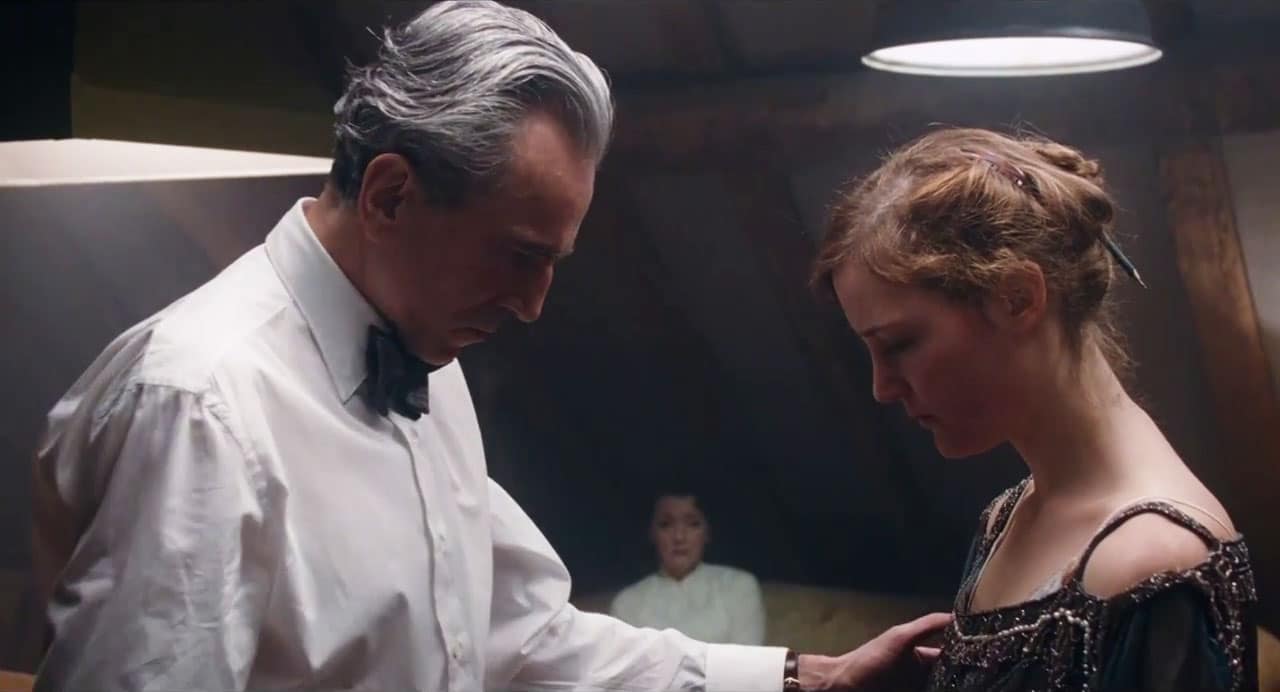
Since his breakthrough movie “Boogie Nights” (1997), director Paul Thomas Anderson has embellished taking every new project in a sudden and unpredictable direction, regardless of familiar thematics and his distinct approach to style. His leap from film to film has felt as outlandish and unpredictable as a M. Night Shyamalan third act twist.
Here with his recent effort, teamed up once again with iconic A-lister Daniel Day-Lewis, after mutual peak work in “There Will Be Blood” (2007), the early trailers hinted at this being a stuffy and slow-burn period drama, centred on Lewis’ dressmaker and a taxing relationship with a younger waitress (Vicky Krieps). Yet the advertising mis-sold a much more amusing and surprisingly hopeful ‘battle of the sexes’ romantic drama.
Day-Lewis (in what is assumed to be his acting swan song) is in fantastic form as usual; it’s a bafflingly subdued performance for the powerhouse actor, subtle in detail and an unpredictable note to go out on. Yet the true scene stealer is the unknown Krieps, who is able to match the veteran and hold her own in a series of standout scenes that pit the two against each other.
The plot’s pivotal dynamic works in more ways than one, with Day-Lewis’s elegant old professional constantly challenged by the less nuanced skills of his female counterpart.
In the large scheme of Anderson’s filmography, this subtle movie feels less essential than some of his more important works, but that doesn’t lessen its quality. It’s a lower-key effort than expected, but one that’s expertly and elegantly made by the two seasoned pros (accompanied by an impressive newcomer).
4. Dunkirk
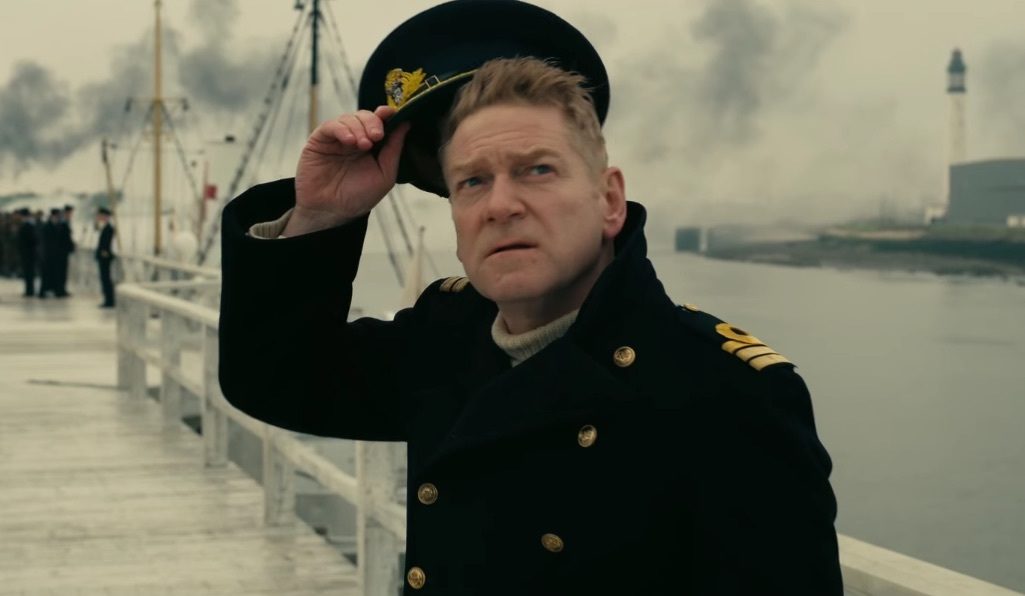
A-list filmmaker Christopher Nolan turned his unique eye to making a war drama this past year, and added his distinct and innovative eye to this well-worn genre as a result. Focused on the devastating evacuation of Britain’s military from France’s beaches of Dunkirk, Nolan chucks the audience into this world headfirst – the opening sequence of a young soldier (Fionn Whitehead), attempting to scramble to safety in a disorientating and wordless sequence, stands out as one of the more set pieces of last year.
From the jump, Nolan sets the precedent to twist the genre into his own trademark aesthetic; the opening is surreal and almost dream-like, with an emphasis on suspense and intrigue over political pandering or overblown drama. Yet surprisingly even for a genre effort that successfully turns its tropes on their head (heck, there isn’t even one major battle scene), it ends up being the most moving and informative experiences on said historical event.
Also, despite the eclectic cast of seasoned thesps (Kenneth Branagh, a masked Tom Hardy) and new talent (Whitehead, Harry Styles), Nolan lets the evacuation itself be the main character, as we jump from several timelines and receive snippets of the event, building a concise narrative from the puzzle pieces.
Yet, there’s less of an emphasis on narrative twists for surprise’s sake, as the uneasy structure is done to make known events feel unpredictable, and put the viewer into the deep end, emotionally and narratively. It’s all expertly strung along by a trademark epic Hans Zimmer score, culminating in a touching third act coda, resulting in one of the director’s more impressive achievements – creating a war movie in this day and age that plays like no other.
3. The Shape of Water
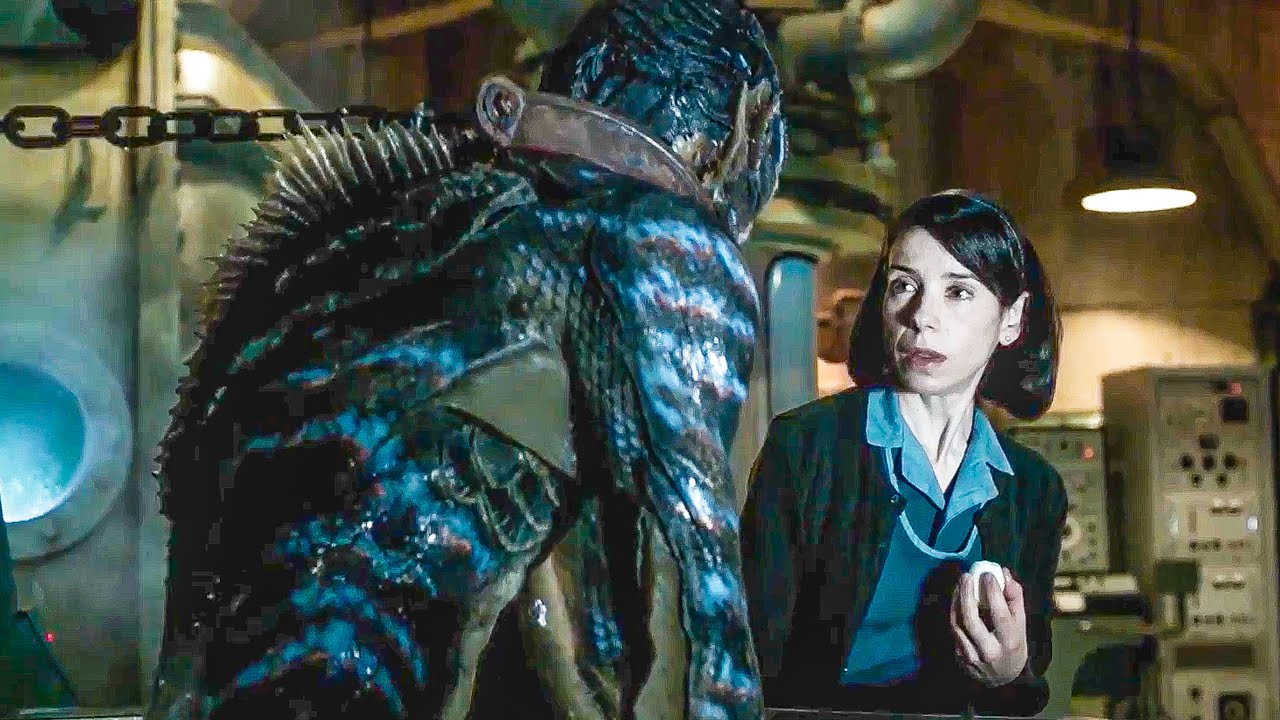
After the unanimous plaudits that director Guillermo del Toro received for “Pan’s Labyrinth” (2006) (arguably his masterpiece), an odd period played out for the Mexican director, “Hellboy 2: The Golden Army” was an amusing if underwhelming blend of superhero and fantasy; “Pacific Rim” was a decent if impersonal attempt at event blockbuster making; and “Crimson Peak” was a slick if shallow homage to classical haunted house movies.
All of these were good time-wasters and all were made with passion and dedication from the talented director. Yet they really lacked that true auteur flavour – blending human drama with delicate and dark fantasy, a balance del Toro brought so well in his Spanish-produced output. Yet with “The Shape of Water,” those attributes return in full force as del Toro embellishes in all things cinematic he loves and does well – it’s a touching and whimsical romance told through the guise of a black fairy tale.
The visuals and effects are gorgeously and carefully executed, but that’s expected even in a lesser del Toro movie. What elevates this is the handling of the human drama, centred around a mute cleaning lady (Sally Hawkins) and her affection toward laboratory fish-man (Doug Jones) and the spiralling consequences it creates.
Add to that the fantastic support from its other players, particularly Octavia Spencer and Richard Jenkins. Although Michael Shannon, who is always good, sadly lands here yet another straightlaced suit slowly unwinding into a villain role. He certainly isn’t lacklustre, the arc just feels overly familiar and one wishes he had been given something more interesting to do.
Still, it’s a very minor quibble in what is one of del Toro’s best in years – not that he had been turning in subpar products, but none had his heart and voice so fully invested in it like this trademark mixture of sweet with dark.
2. Get Out
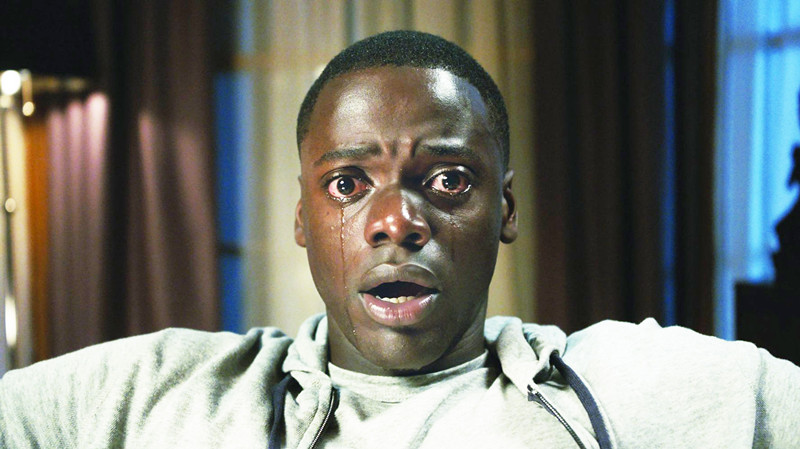
Jordan Peele from retired comedy duo Key & Peele came out of nowhere as a director and dropped last year’s surprise genre smash, a tense and involving horror movie filled to the brim with clever satire and honest modern politics. The film was deservedly a massive sleeper hit, with the former comedian becoming one of the hottest young directors overnight (so much so that he’s completely retired from acting to solely focus on his preferred career).
Inspired by a classic comedy bit from Eddie Murphy’s stand-up (that of how the African-American community would always be one step ahead of horror movie tropes), Peele subverts that idea into a razor analyzation of current racial fears that feels more honest and relevant then most dramas made on the same subject.
It helps that it’s not all heavy handed messaging and prioritises being a bracingly made suspense piece first, fantastically acted by a superior horror cast featuring old reliables Bradley Whitford and Catherine Keener, and impressive turns by up-and-comers Daniel Kaluuya and Allison Williams. This is a film that juggles a dozen balls yet does so without breaking a sweat. Peele’s assured direction and balanced script are really what keeps it standing – an impressive feat, considering it’s his debut.
Yet one must address the elephant in the room – despite being one of the best genre efforts made in recent times, why all the Academy love? The social political agenda in these sensitive times in the industry is most likely the true culprit, even though the horror genre has been a hotbed for important issues; from the sexual innuendo of “Dracula” to the racially charged imagery and thematics in “Night of the Living Dead,” the Oscars never gave this genre the time of day (the closest they got was with crossover thriller “The Silence of the Lambs”).
Yet despite the awkward reasoning for this genre movie’s blatant inclusion, it’s a case of better now than never for a strong genre movie to receive the respect it deserves.
1. Three Billboards Outside Ebbing, Missouri
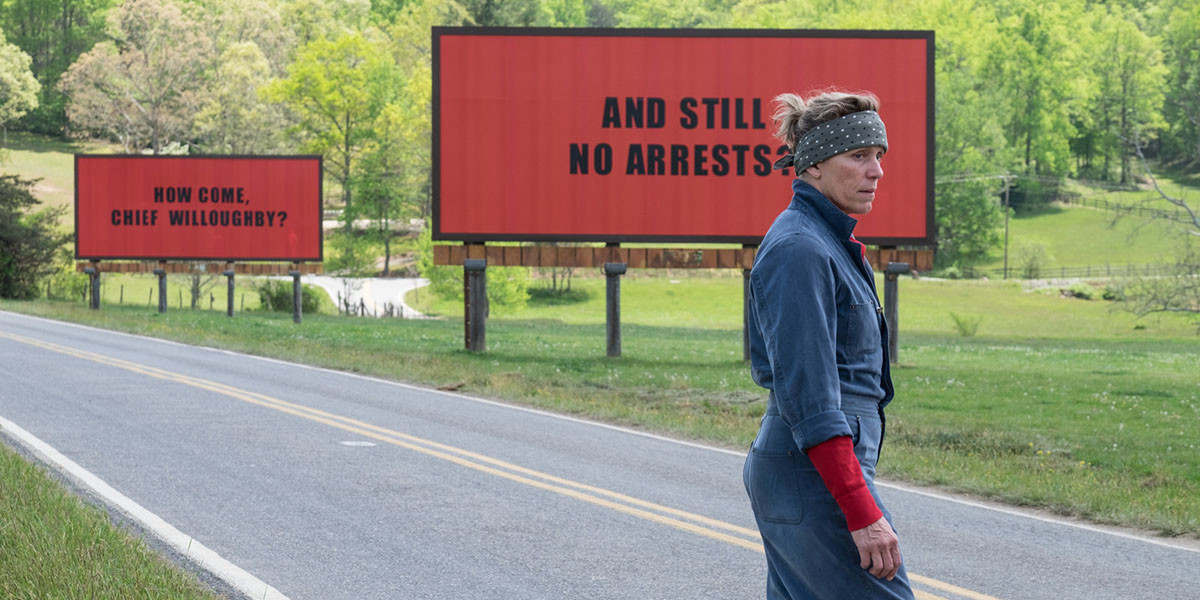
Irish playwright Martin McDonagh has been been growing progressively stronger as a filmmaker with each movie he makes, which is no small feat considering his 2008 sleeper hit debut “In Bruges” was already fantastic, and captured his elaborate style of filmmaking in a nutshell – witty comedy, tough violence, moving sentimentality and a unique world perspective wrapped up in some of the best acting and dialogue you’ll find in cinema.
Well, this stellar trend continues in “Three Billboards,” his most balanced and effective film, centred around Frances McDormand’s mourning mother (a shoe-in for a Best Actress win) who tasks the Ebbing police force to step up their game and solve the tragic murder of her daughter.
The film is carefully told, full of emotion and pathos, yet never reverts to schmaltzy overselling. In fact, its take on a familiar plotline manages to feel fresh and unpredictable when coupled with McDonagh’s distinct character arcs.
This is best exemplified in the director’s (newly anointed) stock player Sam Rockwell, whose simple-minded bigoted police officer goes through the wringer in a total transformation that by the film’s end, he definitely carries the heart of the story of this involving tale of loss and one’s attempts to cope with and justify it.
Fantastically directed, completely engrossing, and as honestly hilarious as it is emotionally moving, if McDonagh keeps making such teflon products as his cinematic output, one can only imagine how he could beat a better product than this one.